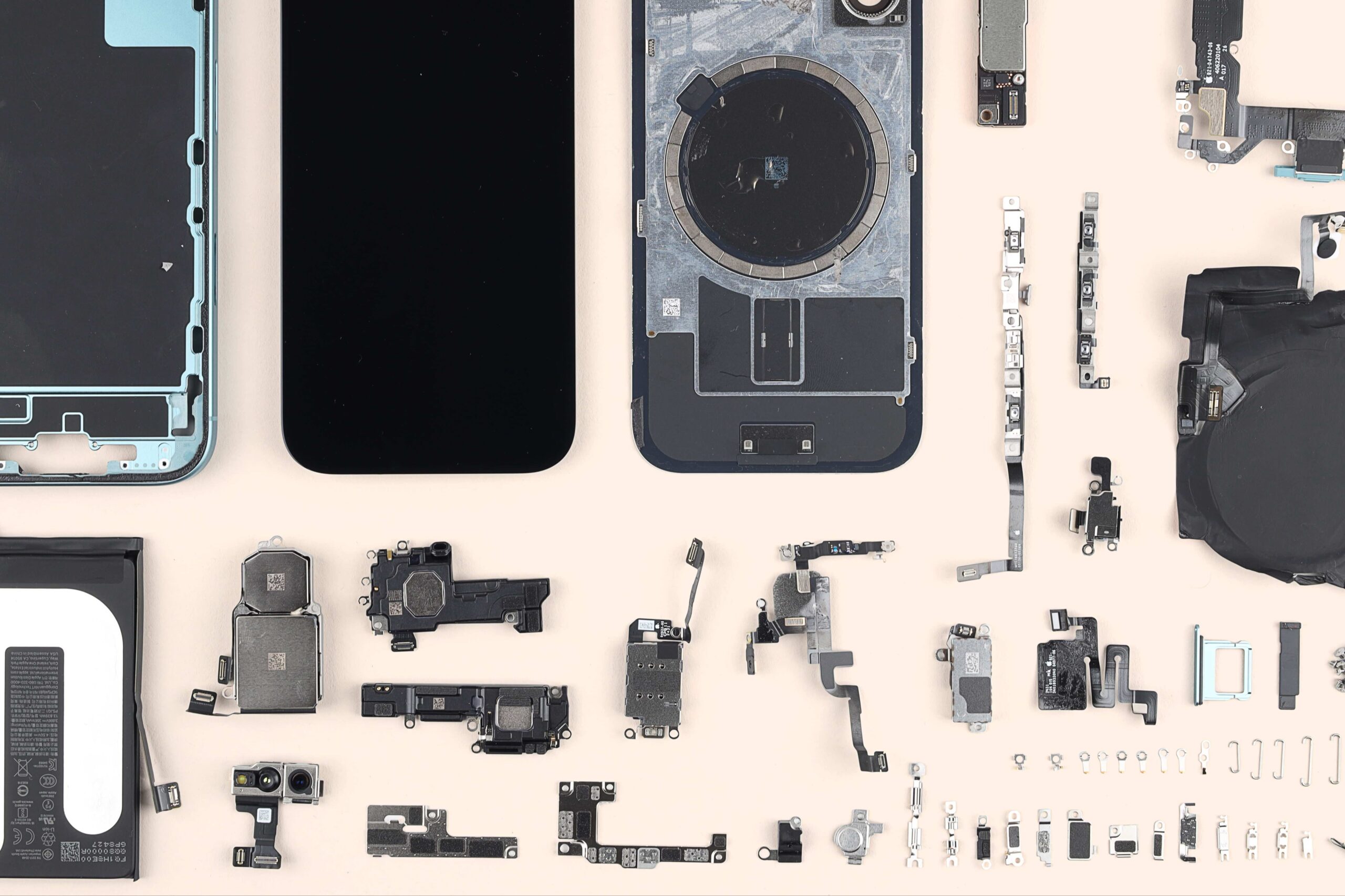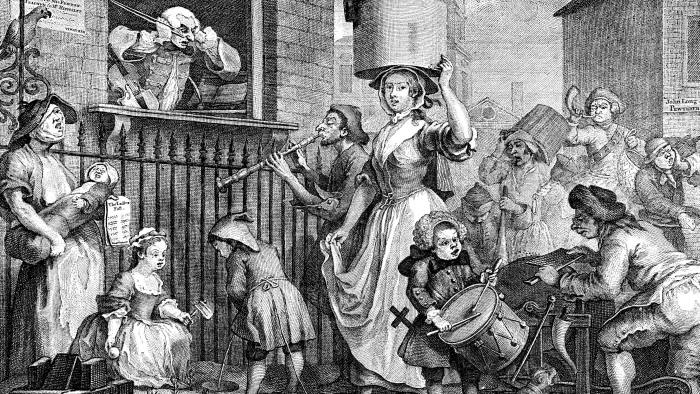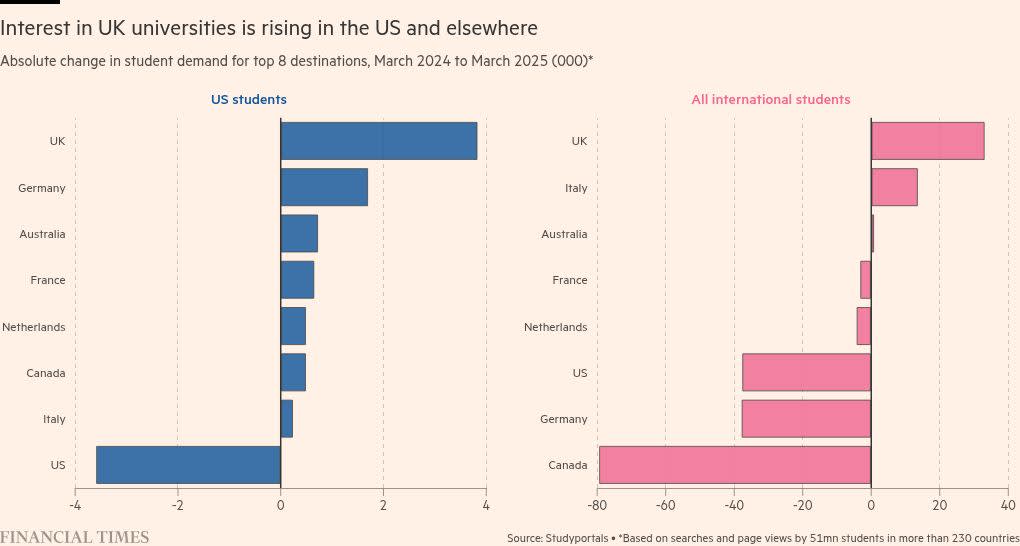This article is an on-site version of our FirstFT newsletter. Subscribers can sign up to our Asia, Europe/Africa or Americas edition to get the newsletter delivered every weekday morning. Explore all of our newsletters here
Today’s agenda: China stockpiles oil; Trump criticises Putin; the era of autonomous strike drones; visual story on iPhone components; and “headphone dodgers”
Good morning. We start the week with a look at how Donald Trump’s trade war, in particular his 145 per cent tariff on Chinese goods, has started to affect US ports and air freight.
What’s the latest fallout? Bookings for standard 20-foot shipping containers from China to the US were 45 per cent lower than a year earlier by mid-April, according to new data. The Port of Los Angeles, the main route of entry for goods from China, expects scheduled arrivals next week to be a third lower than a year before, while air freight handlers have also reported sharp falls in bookings.
Why is this happening? Experts say the moves reflect traders “kicking decisions down the road” as they wait for signs of a US-China trade deal to lower tariffs. American importers are looking to use up inventories before importing fresh stock from China, logistics executives say. They are also holding stock in bonded warehouses where inventory can be stored duty-free with taxes paid on withdrawal, or diverting it to nearby countries such as Canada.
Looking ahead: Industry figures expect trade will be permanently affected, whatever the result of negotiations. Both the US and China have since announced some tariff exemptions but Beijing has said the two sides are not in talks. The industry is set to suffer a further hit if a US “de minimis” exemption, for goods under $800, expires for China on Friday. The scheme is a key route for ecommerce retailers such as Shein and Temu. Here’s more on how supply chains are being redrawn.
Energy imports: The liquefied natural gas industry has warned the Trump administration that it cannot comply with new rules aimed at forcing the use of US-flagged vessels by imposing levies on Chinese-built ships docking at US ports.
For more analysis, sign up for Alan Beattie’s Trade Secrets newsletter if you’re a premium subscriber, or upgrade your subscription. Here’s what else we’re keeping tabs on today:
Canada’s election: Prime Minister Mark Carney will face off in a national election against Pierre Poilievre. The vote takes place after a car drove into a crowd in Vancouver on Saturday night, killing 11 people.
Nato: The alliance marks 70 years since Germany’s accession to the military bloc, with secretary-general Mark Rutte and German President Frank-Walter Steinmeier attending a ceremony in Brussels.
Results: Deutsche Börse and Porsche report.
Five more top stories
1. China is stockpiling oil as the price of crude soars following Trump’s tariffs. Imports of crude oil into China surged in March and have continued to accelerate in April, according to analysts, as the country’s oil traders seek profits despite expectations a weaker global economy will reduce demand. Read the full story.
2. Exclusive: Hungary is being accused of handing more than €1bn in unlawful subsidies to pro-government media, adding to concerns that state support is being used to bolster Viktor Orbán’s grip on power. Two local media outlets have told the Financial Times they plan to lodge a complaint with the EU today. Barbara Moens has more details from Brussels.
3. Trump has expressed mounting frustration with Russia over its continued attacks on Ukraine but asserted that a deal to end the war remained within reach. “I was very disappointed that missiles were [launched] by Russia,” the US president told reporters. “I want [Vladimir Putin] to stop shooting, sit down and sign a deal.”
4. The era of fully automated strike drones are within technological reach, according to a German start-up. The war in Ukraine has accelerated investment in drone technology, and Munich-based Stark said the deployment of next generation machines — that do not require human approval to pick and hit targets — was “not far off”.
Europe re-arms: The EU’s defence spending splurge has opened a lucrative market in security technology for Ireland, a country that prides itself on having been neutral for decades.
5. Saudi Arabia and Qatar will settle Syria’s outstanding debt to the World Bank, the two countries said in a joint statement. About $15mn in funds will be the first financial aid from Riyadh since the fall of the Assad regime, and will help conflict-ravaged Syria access money for postwar reconstruction and public-sector salaries.
More Middle East: Israeli Prime Minister Benjamin Netanyahu has rejected claims that he sought to politicise the Shin Bet domestic spy agency, calling its chief a “liar”.
Visual story

The Trump administration wants Apple to manufacture its iPhones in the US instead of China, where most of them are currently made. But our latest visual story shows how the components that power it make this highly impractical.
We’re also reading . . .
UK banks: Despite rules ushered in after the 2008 financial crisis, Britain’s retail banking market remains dominated by the largest historic players.
UK economy: A country mired in stagnation has to take risks if it is to succeed, especially during tough times, writes Martin Wolf.
Dollar doomsday? Whatever happens with Trump’s tariffs, investors need to prepare for a new market paradigm, writes Rana Foroohar.
Work from office: Data shows younger workers — more than baby boomers — crave the connection and routine of in-person work.
Chart of the day
The number of US students looking to study at UK universities has risen sharply since Trump launched his attack on some of America’s top higher education institutions, data shows.
Take a break from the news
“Headphone dodgers” are the latest entrants in the centuries-long urban battles between noisemakers and their unwilling listeners. FT pop critic Ludovic Hunter-Tilney proposes a way to stop them.



